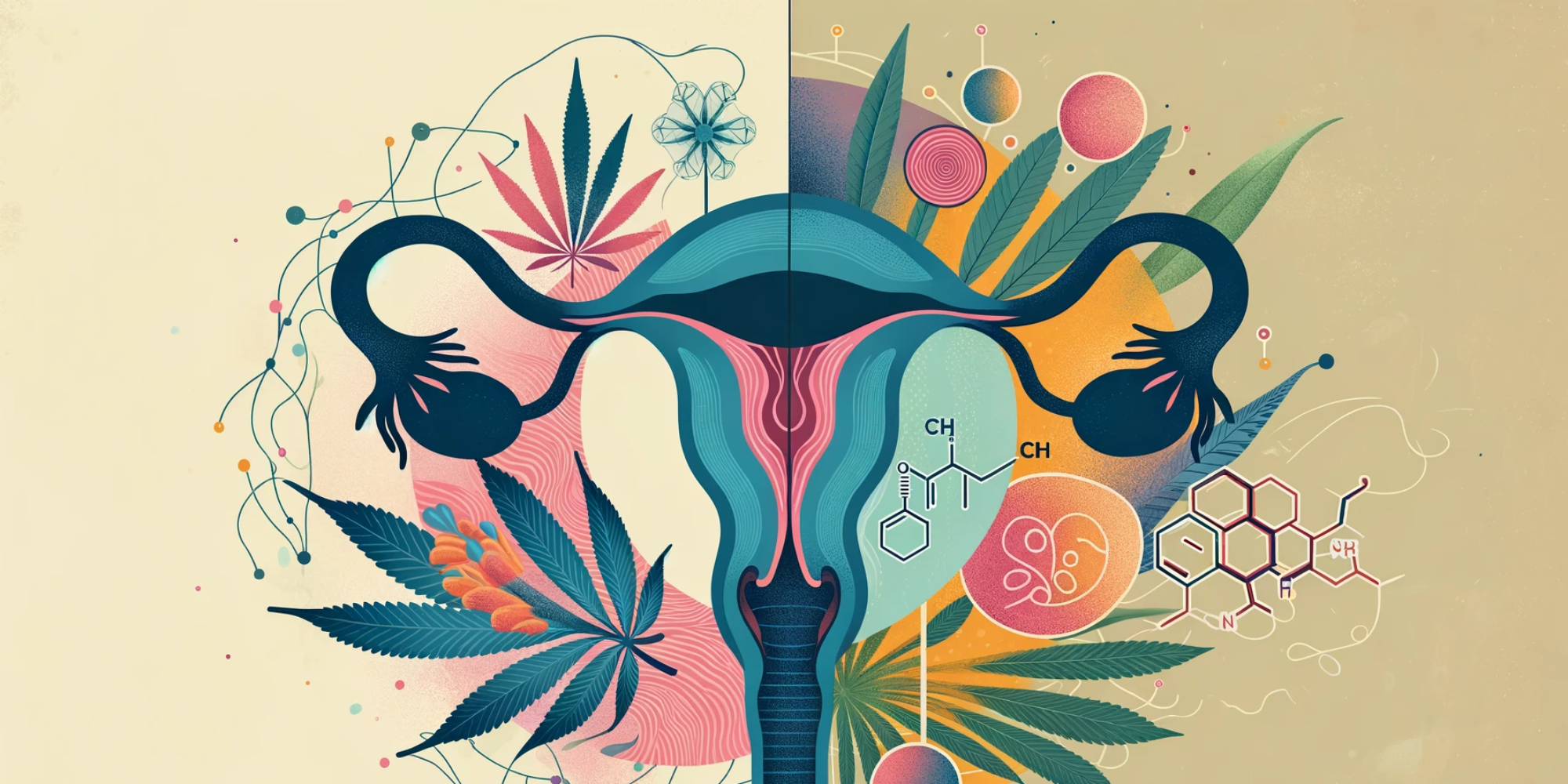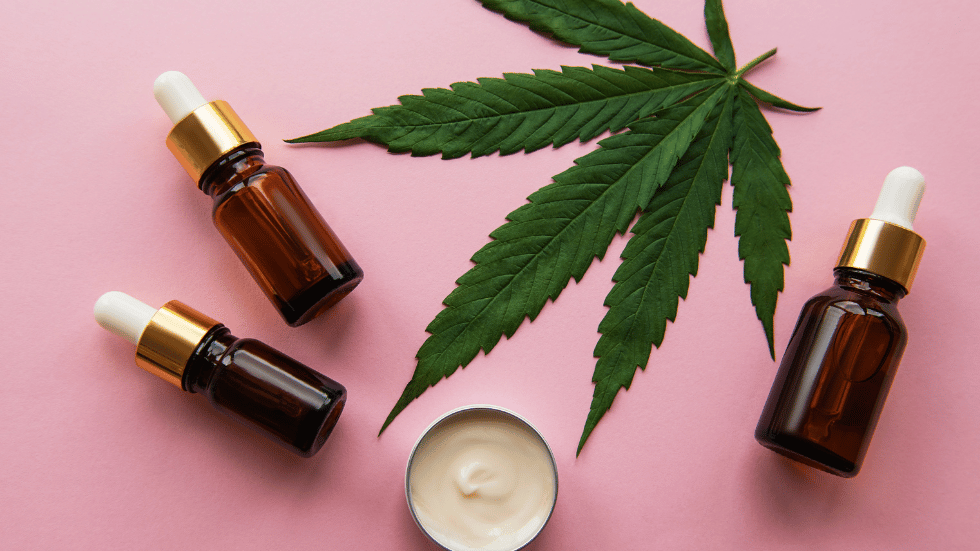CBD effective against endometriosis: Fact or fiction?

Introduction
Endometriosis is a complex and often painful gynecological disease, affecting a significant proportion of the world's female population. While traditional treatments have their limitations, cannabidiol is attracting growing interest as a therapeutic option. This article deepens our understanding of endometriosis and examines in detail the potential of this cannabinoid, drawing on scientific studies and clinical evidence.
What is Endometriosis?
Definition and pathogenesis
Endometriosis is a chronic disease affecting women of childbearing age. It is characterized by the presence of endometrial tissue (the tissue that normally lines the inside of the uterus) outside the uterus. This tissue can be found on the ovaries, fallopian tubes, pelvic organs and sometimes even beyond the pelvic region.
During the menstrual cycle, this tissue reacts to hormones in the same way as the uterine lining: it thickens, disintegrates and bleeds. But unlike the uterine lining, blood and tissue have no way of leaving the body, which can lead to pain, inflammation, and sometimes the formation of cysts and scar tissue (adhesions).
The pathogenesis is complex, involving genetic, immunological and environmental factors. Affecting around 10-15% of women of childbearing age, endometriosis is particularly prevalent in women aged 30 to 40, although it can occur at any post-pubertal age.
What are the symptoms of endometriosis?
The most common symptoms can be physical, such as severe pelvic pain, especially during menstruation, pain during intercourse, infertility, gastrointestinal problems during menstruation, fatigue, abnormal bleeding, but over time can also have psychosocial impacts such as chronic anxiety, depression, isolation... However, the intensity of symptoms is not always indicative of the severity of the condition.

Diagnosis and treatment options
How do you know if you have endometriosis?
Diagnosis is complex, often requiring a combination of clinical examination, ultrasound imaging and laparoscopy. This pathology is frequently diagnosed late, as its symptoms may be similar to those of other conditions. It is usually confirmed by laparoscopy, a surgical procedure that allows endometriosis lesions to be visualized.
Traditional treatments
Treatment of endometriosis may include medication to manage pain and reduce hormones that stimulate endometrial tissue, or surgery to remove endometrial tissue and adhesions. Management is often individualized, as symptoms and severity vary from one woman to another. Unfortunately, taking a lot of medication can have harmful effects on health, particularly the liver. But above all, the body tends to get used to taking them very quickly, and after a few months/years, they no longer have any effect. This is why sufferers sometimes turn to extreme solutions such as hysterectomy, an operation to remove the uterus. All for the sole purpose of eliminating the pain! So how can CBD help women with endometriosis?
CBD and Endometriosis
Cannabidiol, a non-psychoactive component of cannabis, has been shown to have a variety of therapeutic effects that may be particularly useful in the treatment of endometriosis. These include anti-inflammatory and analgesic properties, and an ability to reduce anxiety and improve sleep.
Anti-inflammatory effects
CBD interacts with the endocannabinoid system, playing a crucial role in modulating the inflammatory response. This cannabinoid has been shown to reduce the production of pro-inflammatory cytokines and inhibit the activation of immune cells involved in inflammation. A study published in the Journal of Cellular Biochemistry found that cannabidiol inhibited the expression of genes associated with inflammation in endometrial cells.
Analgesic properties
Cannabidiol can influence pain receptors, such as TRPV1 receptors, which are involved in pain transmission. By acting on these receptors, CBD may help reduce the pain associated with this condition. A review in the 'European Journal of Pain' suggested that this cannabinoid is effective in the treatment of chronic pain, including neuropathic and inflammatory pain.
Effects on Mood and Sleep
Endometriosis can have a significant impact on mood and sleep. CBD has shown positive effects on anxiety and sleep disorders, improving the quality of life of women suffering from them. Studies, such as that published in the Journal of Clinical Psychology, have demonstrated the efficacy of cannabidiol in reducing anxiety.

Considerations for the Use of CBD in Endometriosis
It's important to point out that CBD cannot be considered as a medicine, even though according to various studies, it could have a pain-relieving, anti-inflammatory and anti-depressant effect. Nevertheless, you should always seek your doctor's advice before taking cannabidiol for therapeutic purposes. If your doctor agrees, we recommend starting with low doses and gradually increasing, always under medical supervision. The form of administration (oil, capsule, cream) can be chosen according to symptoms and personal preference.
It is essential to choose high-quality products - and to favor taking oils or creams rather than flowers. flowers or resins - laboratory-tested, to ensure the efficacy and safety of your intake. At 420 Green Roadwe offer a range of of Full Spectrum CBD oils with concentrations ranging from 10 to 30%, as well as more complete oils with CBG and CBN.
Are CBG and CBN useful?
The properties of CBG and CBN may provide a welcome complement to the use of cannabidiol to combat the adverse effects of endometriosis. CBG is being explored for its potential antibacterial, neuroprotective and anti-inflammatory properties. It could be useful in the treatment of inflammatory diseases, pain and certain neurological disorders. As for CBN, a growing number of studies are exploring its potential antibacterial, neuroprotective and anti-inflammatory properties. Its role in sleep management and as a mild analgesic is also being studied. In short, these three cannabinoids acting in concert would be far more effective in intensifying the pain-relieving, anti-inflammatory character of CBD oils than single CBD oils, but would also promote better quality sleep. That's why, over 2 years ago, we launched our Merveilleuse" oil based on CBD (10%), CBG (5%) and CBN (5%). We recommend it above all to people wishing to relieve or at least soothe various symptoms, whatever the pathology, whether physical or psychological.
Conclusion
Current research into the various non-psychoactive cannabinoids and endometriosis is promising, although more in-depth studies are needed. Cannabidiol, cannabigerol and cannabinol are emerging as complementary treatment options for managing the symptoms of endometriosis, offering new hope for many women.
Resources for further study
For more detailed information, we recommend consulting scientific publications, taking part in specialist forums and talking to experts.
This guide, enriched by extensive research data, aims to provide a comprehensive overview of CBD's potential in the treatment of endometriosis, while emphasizing the importance of specialized medical follow-up for any therapeutic consideration.
